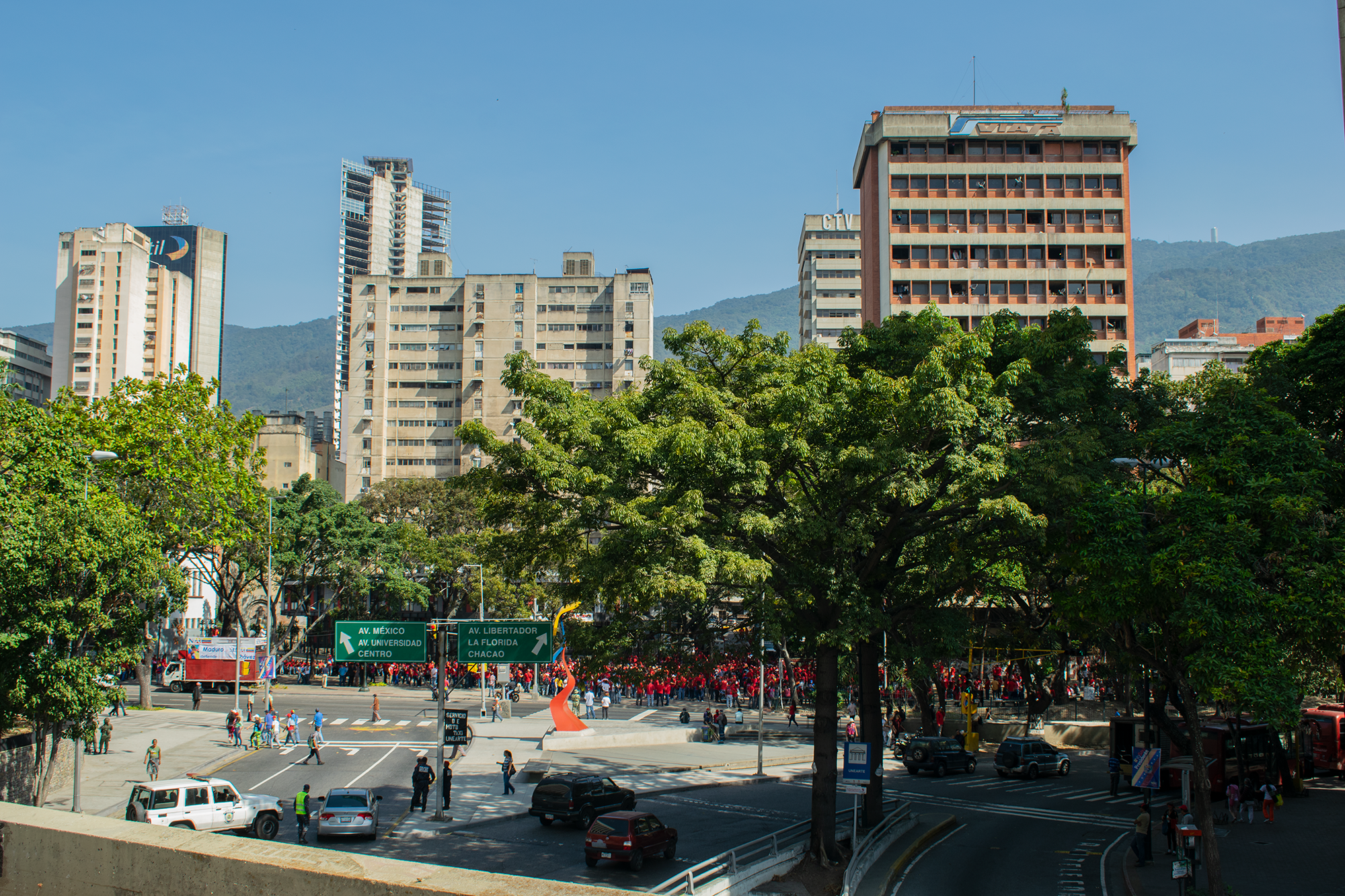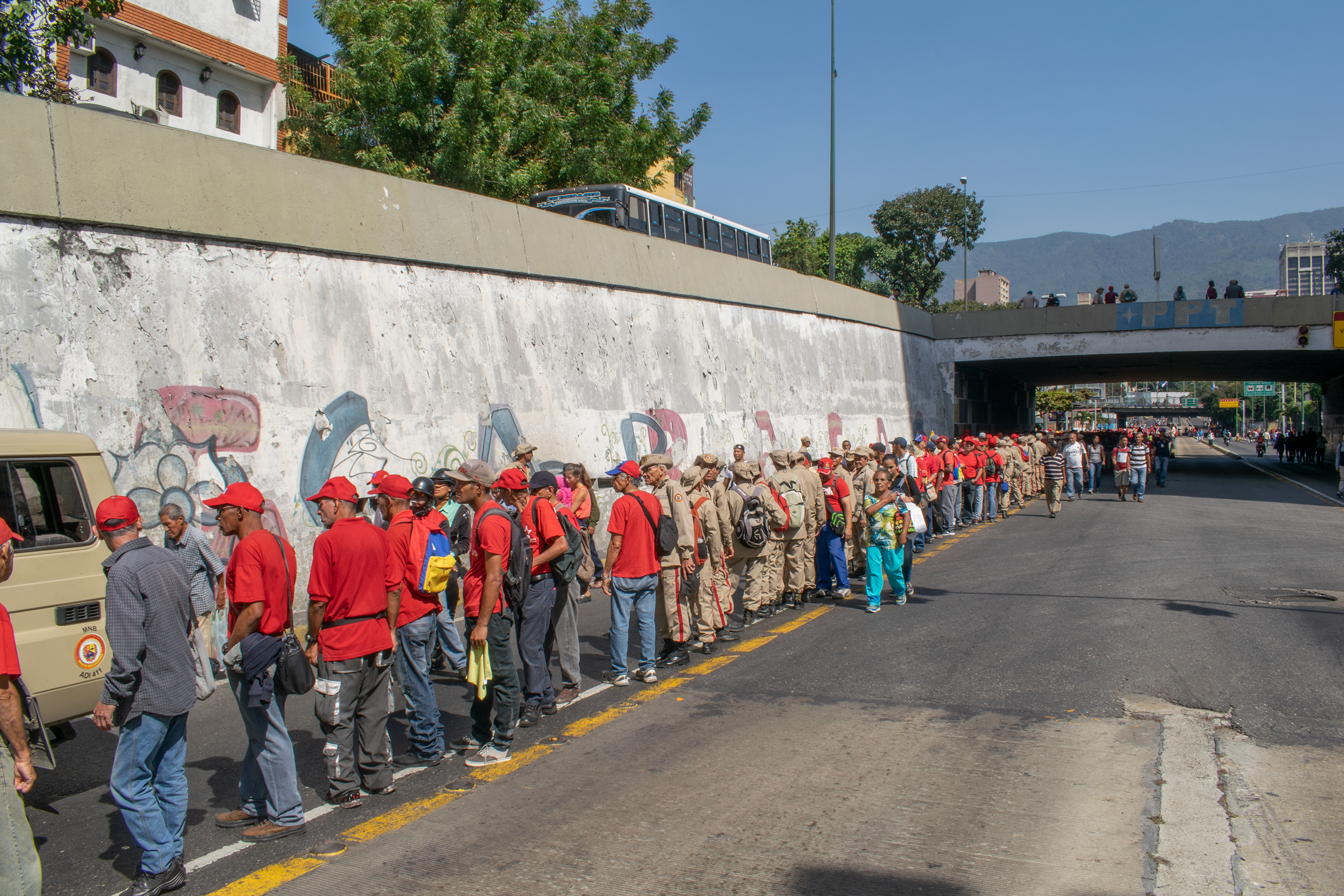A Mass Movement Running on Fumes
Thin crowds, heavy with state employees who were there under duress. That’s all we saw at Maduro’s rally in Bolívar Avenue on Saturday. No banners, chants, or joy. Everything felt like a transaction.


Photo: Efecto Cocuyo, retrieved.
“Cooperate, gather for the picture. It’s like you’re all in a costume,” yells a guy from a truck in front of the Teresa Carreño Theater; it definitely sounded like scolding. It’s 11:00 a.m., a small group congregates in the small square, right under the sun, the rest hide in the shadow.

“There are no banners or chants, everything feels like a transaction.”
There are no banners or chants, everything feels like a transaction. No big smiles or loud music, no one dances in comparison to previous chavista demonstrations. For each “brigade,” there’s one person with a list asking for signatures. At least seven red buses are parked across from the theater, right in front of the Alba Hotel, once the Hilton, expropriated by the government in 2010.
The trucker keeps yelling in the distance, I come closer and see him wearing an insanely thick golden chain around his neck. He’s fully in red and screaming with euphoria, he doesn’t seem aware of the microphone right in front of him. The emotion isn’t shared by his public.
There’s not a soul in the gangway between the hotel and the theater. A man in his thirties decides to take a picture with the theater as background, and is then followed by ten others. I offer to take the picture for them and ask if they’re from around here, if they live nearby. “We’re from Catia,” a woman replies. Since that’s not exactly next door, I inquire about the travel, she says they came with the buses, closing with “VIVA MADURO.”
Nearby, in front of Venezuela’s revenue service (SENIAT), there’s another meeting point. People are scattered around the street, signing the list of attendance. I take a couple of pictures and talk to a thirty-something. Her name is Sonia, she won’t give a last name. After breaking the ice, I ask where she lives, “La Guaira,” she says, tired. “I’ve been here for hours.”
She came in a bus, “like the rest.” I ask three other passers-by, and the answer is the same.

“People are scattered around the street, signing the list of attendance.”
“No pictures allowed.”
It’s past 11.30 a.m., and the Fuerzas Armadas Ave. feels closer to the sun than the rest of the Earth. I visualize a huge line, at least two blocks, of people queuing, possibly the biggest crowd I’ll see today.
“What’s the line for?”
“Lunch,” a young man replies.

“I visualize a huge line, at least two blocks, of people queuing, possibly the biggest crowd I’ll see today.”
He must be 25 or 26. He smiles and I plan on chatting with him, when a brown Jeep parks next to us.
The driver gets off and paces to me. He’s not in uniform and is not identified as PNB (Policía Nacional Bolivariana) yet the truck is. He greets me with distrust. I reply with his same words, “Buenos días,” throwing in a smile.
“Who do you work for?” he asks, getting physically closer, until he’s staring at the top of my head. Basic intimidation.
I lie, I tell him I work for a government-owned newspaper, and he asks for my credential.
“I haven’t been given one yet… but you can call my boss and she will confirm my story.”
He stares at me for the longest seconds and suddenly snaps, “NO, no pictures allowed. You can’t be here. Go away.”
I jump back in the motorbike and think about 11 other press workers without this same luck in previous days, even though Maduro blatantly denied their arrest in a recent interview. “In Venezuela, there’s full freedom of speech.”
“They’re shitting themselves,” Luis says. He’s a husband, father of two and active mototaxista. On our way out from the crowd, he confesses how he used to be a part of the government’s motorbike brigades. He says he did it for the benefits, especially the food, quitting after the CLAP brigade coordinator wanted to keep one of his partner’s rations, when said partner didn’t show up one day.
“I just left, they exploded my phone with calls and I told them ‘yes sure, I’ll be there in one hour,’ and never showed up. Those miserable people.”
“People there (in El Valle, where he lives,) used to be one hundred percent red, now even the ratas from the crew want this to be over. We’re tired.”
I ask him if he thinks people in barrios are scared of retaliation.
“Not anymore”, he says. “Now we’re just arrechos.”
Caracas Chronicles is 100% reader-supported.
We’ve been able to hang on for 22 years in one of the craziest media landscapes in the world. We’ve seen different media outlets in Venezuela (and abroad) closing shop, something we’re looking to avoid at all costs. Your collaboration goes a long way in helping us weather the storm.
Donate




